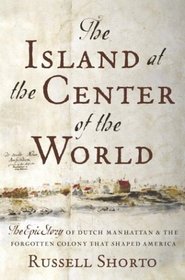I always assumed what I was taught in school about the Dutch colony in North America was true. It isn't.
Since I hate to underline or highlight text in books, I use book darts instead. If you don't know what these are, google it. When I read a history book with interesting things I want to find quickly, I often use as many as 8-10 book darts. When I finished this book and counted the book darts I used, the total came to 41 ! This is an amazing book. To list all that I found important would take pages.
I always thought the Dutch had a small colony on Manhattan Island, with nothing really exciting taking place before the British captured it. Ha! The Dutch colony actually covered areas over five of the original 13 American colonies. And it was there for almost 100 years. I never knew Manhattan changed hands five times in three decades. I've read about the Dutch colonies in other areas of the world, and the one on Manhattan was so unlike them, it was startling. The Dutch were known for their cruelties in other areas, which is one reason why the British hated them and, as a result, worked to erase what the colony on Manhattan accomplished.
As the author points out in the book, so much of what our country is was due to the traditions that were part of the colony on Manhattan. This goes far beyond what other reviewers have said about place or family names. As for the latter, I confess my ignorance that I never thought American families like the Roosevelts, Vanderbilts and Van Burens were originally Dutch settlers. Unlike other countries, the local Dutch governments had a legal scholar who sued others on behalf of the state. Today we know this person as the "district attorney." Some of the rights these settlers enjoyed, which we think of as being original to us, were the rights to practice religious beliefs freely, to speak freely, and not to have troops quartered in their homes. Later these became part of our Bill of Rights after the U.S. Constitution was drawn up. And I know that without the Bill of Rights, the states may not have approved the Constitution.
Unlike other areas of the world at that time, so many other cultures existed freely on Manhattan and interacted peacefully... Dutch, British, French, German, Finnish, Swedish, etc. Even slaves had certain rights and American Indians were able to sue white traders in Dutch courts. Compare this to the four English colonies in New England where people who didn't practice the established religion were placed in prison, tortured and killed. In school I was taught the Puritans came to America to practice religion freely. Well, they did, but it was their own religion they wanted to practice. If you didn't believe as they did, then you quickly learned how intolerant the Puritans were.
I highly recommend this book to anyone with a tie to New York, and to the rest of you who wish to know just how much we own to this particular Dutch colony. This book is a keeper.
I'll finish by relating just four great stories out of many in the book. First, the Dutch had the tradition of Saint Nicholas leaving small gifts to children on December 6th. When the children of other cultures saw this they pressured their families to do the same. The tradition was pushed forward a couple of weeks to December 25th, and the tradition of Saint Nicholas---who the Dutch called "Sinterklaas"---began its American odyssey. Second, the original Swedish colony, which the Dutch eventually incorporated into theirs, brought many people from Finland to use as laborers. These people brought with them their forest-clearing skills. Among these was the concept of building homes using the logs they cut. Thus began the great American tradition of the log cabin.
Third... Due to a temporary grain shortage, the colony's Dutch government once ordered bakers not to make any more koeckjes, jumbles or sweet cakes. The Dutch pronounced "keockjes" as "cook-yehs." Which is why the British eat biscuits, but we Americans eat cookies. And fourth, the women of New Amsterdam would chop up a head of cabbage finely, add vinegar and melted butter and serve it alongside the main entree. They called this cabbage salad "koolsla."




